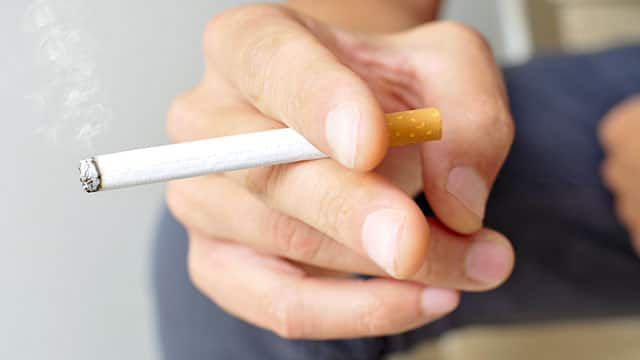What Are the Effects of Smoking on Oral Health?
Chances are this isn't the first time you've heard this – smoking is bad for you. According to a 2020 Surgeon General's Report, it's the leading cause of preventable death in the country. It can lead to a laundry list of diseases and can be problematic for just about every organ in your body.
Smoking also has detrimental effects on your mouth. It can make your breath stink, discolor your teeth and give you smoker's tongue, lead to tooth decay, gum infections, periodontal disease, can result in tooth loss, and can even cause oral cancer. If you are still a smoker, the first step you should take to improve your oral hygiene (and your health in general) is to quit.
Learn how to quit smoking.
How Can Smokers Practice Good Oral Hygiene?
Cigarette smoke allows bacteria to flourish in your mouth. At the same time, the smell of the smoke lingers on your breath, both of which make diligence in your oral care routine especially important.
Brush at least twice a day. Floss or clean between your teeth with interdental brushes or water flossers at least once a day, and use antimicrobial mouthrinses and tongue scrapers. Be sure to see your dental professional for regular cleanings to check the health of your teeth and gums. If you notice any irregularities or sensitivities in your gums' health, don't wait until your next checkup – make an appointment with a dental professional right away.
How to Whiten Smoker's Teeth
Smoking cigarettes will stain the enamel on your teeth over time, but if you've quit, there's good news. You can reverse some of these effects. There are effective whitening treatments available to you, both from your dental professional and over-the-counter.
At-home whitening options can be both cost-effective and productive. There is whitening toothpaste with bleaching agents and an abrasive quality that will gently polish your enamel to remove stains. Consider adding mouthrinses with hydrogen peroxide to your routine. Whitening gel pens can also help whiten your teeth at home, coating them with a peroxide gel that will help to strip away the hardened residue left over by each cigarette.
Professional teeth whitening costs a bit more, but if your stains are too deep and stubborn for over-the-counter products, you may find a professional cleaning to be more effective. Your dental professional will apply a whitening gel to your teeth, and then they will shine an ultraviolet light on your teeth to actuate the gel's whitening ingredients. Whereas at-home products are a process, you may experience results from this professional treatment immediately.
Learn about four different types of teeth whitening products.
How to Identify Symptoms of Gum Disease Caused by Smoking
According to the Centers for Disease Control and Prevention (CDC), smokers are twice as likely as nonsmokers to have gum disease (periodontal disease). Gum disease damages the tissues that hold your teeth in place and can cause your teeth to loosen or even fall out. Anyone who doesn't practice good oral hygiene can get gum disease, but according to the National Institute of Dental and Craniofacial Research, smoking is the most significant risk factor.
Gum disease symptoms to look out for include:
- Persistent bad breath
- Pain when you chew
- Tender, red, or swollen gums
- Bleeding gums
- Sensitive teeth
- Loose teeth
- Receding gums (your teeth appear longer)
You may be wondering, "If I stop smoking, will my gums repair themselves?" Not necessarily, but don't wait to see your dental professional until after you experience these symptoms. By catching gum disease early, you will be in the best position to treat the condition.
If your dental professional diagnoses you with gum disease early, scaling and root planing can reverse its effects. Your dental professional will remove plaque from your teeth and under your gums using manual tools and ultrasonic instruments. Your dental professional can smooth out the roots of your teeth to help ensure your gums reattach after the procedure. Scaling and root planing can require one or more visits.
Learn more about scaling and root planing.
According to the Mayo Clinic, if you have advanced periodontitis, you may require one of the following surgeries:
- Flap Surgery (Pocket Reduction Surgery)
- Small incisions will be made in your gums, exposing the roots for more effective scaling and root planing.
- Soft Tissue Grafts
- Tissue from the roof of your mouth (or another donor source) is attached to an area of gum recession.
- Bone Grafting
- Synthetic bone, your bone, or donated bone is grafted to the bone around your tooth root, helping to prevent tooth loss.
- Guided Tissue Regeneration
- A biocompatible material is placed in your gum to prevent unwanted tissue from entering an area of bone loss, allowing bone to grow back instead.
- Tissue-Stimulating Proteins
- A gel containing proteins found in developing tooth enamel is applied to the diseased tooth root. This gel stimulates the growth of healthy bone and tissue.
Smoker's Melanosis
Smoker's melanosis is the darkening of the tissue in your mouth from smoking. The melanosis itself is benign, but if you're a smoker, you should still be concerned about other adverse health affects your habit can have on your gums. To get rid of the discoloration in your mouth, The American Academy of Oral Medicine says there is no treatment for this condition – but if you quit smoking, your tissue will likely return to its normal color within 36 months.
Smoking and Oral Cancer
According to John Hopkins Medicine, smokers have ten times the risk of getting oral cancers than nonsmokers have. Quitting is the best way to ensure you stay oral cancer-free. Smoking Cessation – A Report of the Attorney General says there is sufficient evidence showing that, after quitting smoking for 5-10 years, your chances of getting cancer in your mouth, throat, or voicebox decreases by half.
However, quitting does not rid your chances of getting oral cancers completely. Be sure to continue seeing your dental professional for regular checkups and cancer screenings – especially if you have any sores or lumps that may indicate a malignant condition. When diagnosed early, oral cancer can be significantly more treatable.
If you have any of the following symptoms, you should see a doctor:
- Difficulty swallowing
- Abnormal lumps or bumps
- White or reddish discoloration
- Pain in your mouth or ears
- Sores on your lips or mouth that won't heal
- Any loosening of your teeth
Treatment for oral cancers can include one or a combination of the following treatments:
- Surgery
- Surgical operations can cut out cancer from the infected area.
- Radiation Therapy
- Radiation therapy sends high beams of energy to kill cancer cells.
- Chemotherapy
- Chemical drug treatments can kill cancer cells.
- Targeted Drug Therapy
- Targets the genes and proteins that help your cancer cells grow.
- Immunotherapy
- Immunotherapy can amplify or suppress your immune system's natural responses as needed.
Quitting smoking can be challenging. But when you consider that the alternative isn't just bad oral hygiene but potentially life-threatening conditions as well – the effort will be well worth your while. If you've already quit, we commend you. Sincerely. Now, by practicing good oral hygiene, and with the help of dental professionals, you can make the adverse effects of tobacco products a thing that disappears into the past like a puff of smoke.
Oral Care Center articles are reviewed by an oral health medical professional. This information is for educational purposes only. This content is not intended to be a substitute for professional medical advice, diagnosis or treatment. Always seek the advice of your dentist, physician or other qualified healthcare provider.
ORAL HEALTH QUIZ
What's behind your smile?
Take our Oral Health assessment to get the most from your oral care routine
ORAL HEALTH QUIZ
What's behind your smile?
Take our Oral Health assessment to get the most from your oral care routine















